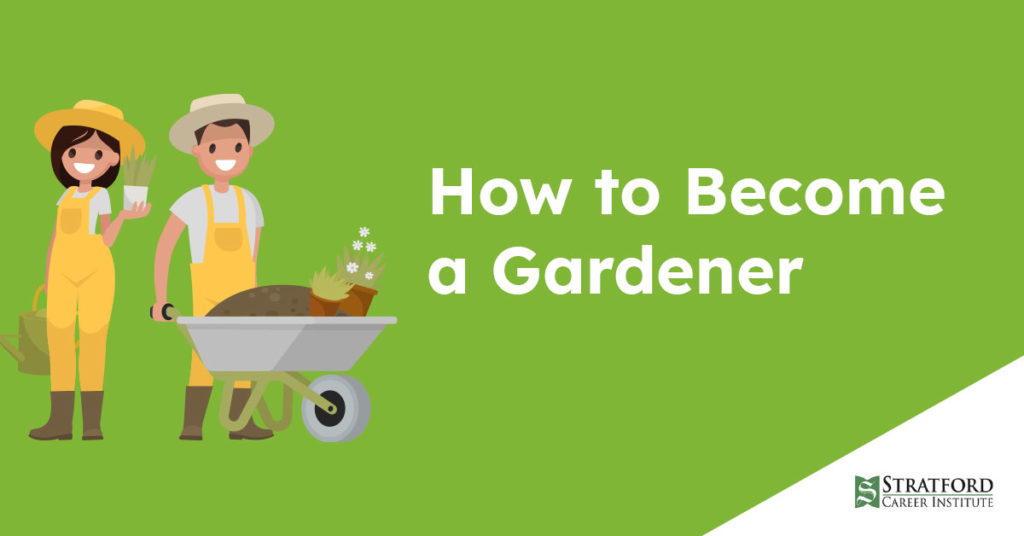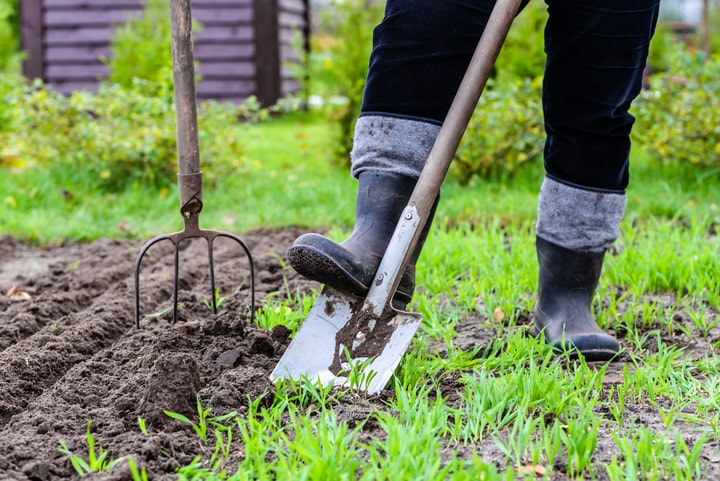
Professional gardeners have broad knowledge about the different plants that grow in the area where they live. They maintain these plants and the outdoor spaces where they work. Gardeners use their expertise to create inviting outdoor areas.
People often wonder how to become a gardener. There are many different ways to become a gardener, but typically you can get hired with just a high school diploma. From there, you can gain on-the-job experience.
What Is a Gardener?

Gardeners keep gardens and landscapes looking beautiful. They maintain the greenery by monitoring plant health and ensuring sufficient absorption of water and nutrients. A gardener might also help with landscape design using plants, flowers, trees, and shrubs.
If you want to work as a gardener, it’s essential to understand the job’s duties.
What Are a Gardener’s Duties?
A gardener has a variety of duties.
The following are examples of those responsibilities:
- Cut grass,
- Trim trees and hedges,
- Water greenery,
- Arrange flowers,
- Service garden equipment,
- Lay down fertilizer,
- Apply pesticides,
- Install and maintain irrigation systems,
- Mow lawns,
- Clear weeds from landscaping,
- Apply fungicides,
- Monitor plant and greenery health, and
- Clear debris from landscapes.
The scope of these duties depends on the job. Sometimes, a gardener is responsible for caring for a particular plant, especially if it is rare or exotic. A gardener may be responsible for a flower or vegetable garden. Other times, a gardener is responsible for watering and maintaining a property’s entire greenery. A gardener can even be responsible for designing and installing the whole landscape.
ENROLL TODAY
Ways to Become a Gardener
Below is some information on different paths you can take to become a gardener.
Get a High School Diploma or GED
There is no educational requirement to become a gardener. You don’t even need a high school diploma or GED. However, that being said, many applicants have at least those educational requirements.
To learn about gardening while still in school, consider getting some experience helping a gardener.
Get A Degree Or Certification
Many colleges and community colleges offer degrees or certifications in horticulture and landscape design for those interested in becoming professional gardeners. Additionally, you will be more marketable if you have a gardening certification.
Some jobs require only a certification to get hired while others will require a college degree. Do some research on the jobs you want so that you can obtain the appropriate credentials.
Take Online Courses
You can also take gardening courses online. Online courses can teach you how to be a gardener in the comfort of your home or anywhere else.
Online courses can be a good option for learners who already have jobs but are looking for a new career opportunity where they can put their green thumb to work.
These courses can be more economical than enrolling in a college degree or program.
Obtain a Master Gardener Status
A master gardener program trains interested individuals about the science and art of gardening. Once you complete a master gardener program, you will receive a master gardener certification. To get this certification, you must complete a set number of required courses and volunteer for a set amount of hours.
Master gardeners are active in their communities, teaching the public about horticulture and gardening. Master gardener programs also sometimes offer phone and email advice, which is often provided by volunteers.
Master gardeners may also speak to community groups to raise awareness about green spaces and spread knowledge about local plants.
Learn from Experience
Lastly, you can learn how to become a gardener from experience.
Gardening is a job where education is not responsible for job performance.
A gardener needs to be able to do the following:
- Understand the different plant species,
- Know how to care for greenery,
- Mow lawns,
- Set down mulch and fertilizer, and
Many people learn these skills by working with someone who instructs them.
Explore a New Career!
Gain Real-World Experience
Once you get a degree, earn a certification, or complete a master gardener program, you can then begin to look for jobs as a professional gardener.
Professional gardeners can work in a variety of different roles, including:
- Nursery manager,
- Landscape designer,
- Gardener,
- Arborist, and
- Florist.
Professional gardeners have a lot of different skills, allowing them to be qualified for many different jobs. Volunteering can also give you valuable contacts in the gardening industry, which could eventually lead to employment opportunities.
Work Conditions for a Professional Gardener
Although in the often relaxing outdoors, the work conditions for professional gardeners are not always the best. Gardeners work all year in some areas and often work during bad weather. Plants and landscapes need tending, which can be hard physical labor.
Professional gardeners need to have a strong work ethic and be prepared each day for different challenges. If you are someone who prefers working outdoors rather than sitting behind a desk, gardening could be a great career choice for you.
Is Gardening a Physically Demanding Job?
Yes. A gardener’s job involves a lot of physical activity.
A gardener frequently will do activities like the following:
- Lifting heavy bags of fertilizer and mulch,
- Lifting gardening equipment,
- Kneeling to work in gardens and flower beds,
- Bending to reach greenery, and
- Climbing ladders to reach greenery.
Therefore, a gardener must be physically fit to perform these actions.
How Much Do Gardeners Make?
A gardener’s salary depends on several factors, including the following:
- Type of worker (seasonal or year-round),
- Private or government employer,
- Experience,
- Intensity of work, and
- Types of duties.
The Bureau of Labor Statistics estimates that ground maintenance workers earn about $22.26 per hour.
Is Gardening a Growing Field?
Yes. The Bureau of Labor Statistics projects that ground maintenance positions, including in gardening, are projected to have a 3% increase in growth from 2022 to 2032.
Where Can a Gardener Work?
Gardeners do not work in just one industry. A gardener can work in a variety of industries, private or public.
Examples include the following:
- Private businesses,
- Individual residences,
- Homeowners association,
- Educational institution,
- Governmental agency, and
- Commercial enterprise.
If you think gardening is the career for you, try our gardening course at Stratford Career Institute.
Interested in Learning More About Becoming a Professional Gardener?
Check out Stratford Career Institute’s gardening and landscaping online course to determine if this career is right for you.
You will learn everything you need to know about how to become a professional gardener, including:
- Understanding and identifying plants;
- Garden maintenance and garden features;
- Selecting and using plants in the garden;
- Gardening prep and design;
- Soil and fertilizer;
- Growing vegetables, herbs, and fruit;
- Creating water gardens;
- Marginal and periphery plants;
- Creating flower gardens;
- Perennials, annuals, and biennials; and
- Maintaining your garden.
Becoming a gardener requires work and dedication. But it may lead to an exciting new career.
Enroll in our gardening class today!
Interested in a Gardening Career?

Grow your knowledge and learn how to apply it by enrolling in our distance-learning course!



